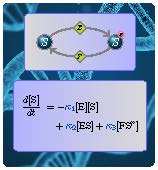Summer Graduate School
| Parent Program: | -- |
|---|---|
| Location: | Max Planck Institute for Mathematics in the Sciences |
Show List of Lecturers
- Timo de Wolff (TU Braunschweig)
- Alicia Dickenstein (University of Buenos Aires)
- Elisenda Feliu (University of Copenhagen)
Show List of Speakers
- Timo de Wolff (TU Braunschweig)
- Alicia Dickenstein (University of Buenos Aires)
- Elisenda Feliu (University of Copenhagen)

The aim of the course is to learn how tools from algebraic geometry (in particular, from computational and real algebraic geometry) can be used to analyze standard models in molecular biology. Particularly, these models are key ingredients in the development of Systems and Synthetic biology, two active research areas focusing on understanding, modifying, and implementing the design principles of living systems.
We will focus on the mathematical aspects of the methods, and exemplify and apply the theory to real networks, thereby introducing the participants to relevant problems and mechanisms in molecular biology. As a counterpart, however, the participants will also see how this field has in the past challenged current methods, mainly in the realm of real algebraic geometry, and has given rise to new general and purely theoretical results on polynomial equations. We will end our lectures with an overview of open questions in both fields.
School Structure
There will be two lectures and two problem sessions per day. Lecturers and teaching assistants will lead the problem sessions, which will include both theoretical and computational exercises (with the use of software). The purpose of these sessions is to reinforce and deepen students' understanding of the material presented in the lectures. At the end of the first week, teams of students will be assigned projects which will be worked on until the last day of the school, which will be devoted to the presentation of the projects. We hope that some of these projects will eventually lead to research articles. We also expect that the students will acquire some experience in reading papers by authors from other disciplines while working on the project. There will be a few evening sessions with different types of activities.
Suggested Prerequisites
- The minimum requirements includes a good command of linear algebra and advanced calculus.
- Acquaintance with computational algebraic geometry (e.g. from Chapters 1-4 and 9 of the book “Ideals, varieties and algorithms” by Cox, Little and O’Shea, Springer)
- Some basics of autonomous dynamical systems (e.g. from Chapter 1 of the book “Differential Equations and Dynamical Systems” by Perko) would be very helpful.
- Familiarity with free or commercial computer algebra software as Singular, Sage, M2, Maple or Mathematica would be desirable.
- All students must bring their own laptop.
For eligibility and how to apply, see the Summer Graduate Schools homepage
Due to the small number of students supported by MSRI, only one student per nominating institution will be eligible to be funded by MSRI. Students may must also apply directly with Max-Planck Institute, see this page for more information.

real algebraic geometry
chemical reaction networks
mass-action kinetics
steady states
multistationarity
stability
oscillations
polynomial ideals
binomial ideals
elimination of variables
rational parametrizations
positive real roots
Newton polytope
regular subdivisions
Brouwer degree
Laplacian matrix
systems biology
synthetic biology
|
Jun 12, 2023 Monday |
|
|||||||||||||||||||||
|---|---|---|---|---|---|---|---|---|---|---|---|---|---|---|---|---|---|---|---|---|---|---|
|
Jun 13, 2023 Tuesday |
|
|||||||||||||||||||||
|
Jun 14, 2023 Wednesday |
|
|||||||||||||||||||||
|
Jun 15, 2023 Thursday |
|
|||||||||||||||||||||
|
Jun 16, 2023 Friday |
|
|||||||||||||||||||||
|
Jun 17, 2023 Saturday |
|
|||||||||||||||||||||
|
Jun 19, 2023 Monday |
|
|||||||||||||||||||||
|
Jun 20, 2023 Tuesday |
|
|||||||||||||||||||||
|
Jun 21, 2023 Wednesday |
|
|||||||||||||||||||||
|
Jun 22, 2023 Thursday |
|
|||||||||||||||||||||
|
Jun 23, 2023 Friday |
|